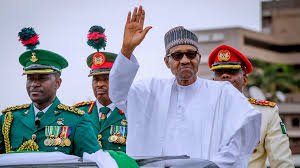The passing, on Sunday July 13, of former Nigerian president, Muhammadu Buhari, in a London hospital, has ignited a storm of emotions across Nigeria’s political and social spectrum. Tributes have poured in from former colleagues, foreign leaders, and party loyalists, painting a familiar portrait of a “disciplined patriot” and “man of integrity.” But in the streets of Nigeria — from Kano to Port Harcourt, Lagos to Calabar — the tone is far less forgiving. Unconfirmed videos emerged online of crowds chanting in celebration. Some commentators boldly said he would not be missed. In the court of public opinion, Buhari had long received his verdict: a leader who promised much, delivered little, left his country far worse than he met it, and showed no remorse for his many failures.
His death abroad — in a foreign hospital he trusted more than those in the country he once governed — is perhaps the most fitting metaphor for the contradictions that defined his legacy. A president who once declared he would “stop medical tourism” ended up a lifelong subscriber to it. Buhari’s years-long reliance on overseas treatment, especially in the United Kingdom, underscored a sobering truth: Nigeria’s leaders build no hospitals they trust, fix no roads they use, and preside over a broken system they privately escape.
When Muhammadu Buhari returned to power in 2015, he did so on a tidal wave of hope. Many Nigerians, weary of the corruption-tainted Goodluck Jonathan era, looked to the former military ruler as a messianic figure who would cleanse the system with Spartan discipline and zero tolerance for graft. He was marketed as the incorruptible general, the man who would slay the hydra of Boko Haram, rein in elite impunity, and restore national dignity.
Instead, his presidency became a study in disillusionment.
On security, Buhari’s biggest promise — defeating Boko Haram — quickly unraveled. Insurgency in the North East was soon joined by banditry in the North West, farmer-herder clashes in the Middle Belt, secessionist agitations in the South East, and oil theft in the South South. Under his watch, Nigeria became the kidnapping capital of the world. Nigerians who once hailed the general for his military acumen began to question his will, or even his capacity, to lead.
He was widely accused of nursing an ethnic agenda for his efforts to secure state-sponsored preferential treatment for his itinerant cattle rearing Fulani kinsmen over rural sedentary farming communities. Some even say he secretly commissioned violent non-state actors to deal with secessionists agitations in the Southeast — a move that spiraled into the “unknown gunmen” crisis with many unsolved crimes and innocent casualties.
On the economy, Buhari’s tenure was marked by two recessions, spiraling inflation, mass unemployment, and a shrinking middle class. The naira lost more than 70% of its value during his time in office. A rigid monetary policy, currency controls, and protectionist tendencies strangled business confidence. Rather than usher in economic revival, Buhari’s presidency saw Nigeria plunge deeper into poverty, with over 133 million people — more than half the population — living in multidimensional poverty by 2023, according to credible international reports.
Even on anti-corruption, the supposed centerpiece of his administration, Buhari floundered. His fight against graft was selective and partisan. While opposition figures were prosecuted with gusto, many corrupt allies remained untouchable. The infamous cases of alleged mismanagement at the NNPC, the Economic and Financial Crimes Commission (EFCC), and even within the Presidency were either swept under the carpet or never investigated. Nigerians were left to wonder whether the war on corruption was real or simply a political tool for managing enemies.
In the realm of governance and human rights, Buhari’s administration was deeply criticized for shrinking civic space, disregarding court orders, and enabling police brutality. The #EndSARS protests of October 2020 and the Lekki Toll Gate shootings became defining moments of state repression under his watch — moments that exposed the authoritarian instincts that lingered from his military past.
Yet, it was not all failure.
His defenders point to the completion of long-delayed infrastructure projects — like the Second Niger Bridge and some railway lines — and his push for agricultural self-sufficiency, notably in rice production. Some also praise his personal austerity and modest lifestyle, which stood in contrast to the flamboyance of many in Nigeria’s political class. But these modest gains were not enough to redeem a tenure marred by economic mismanagement, insecurity, and an almost clinical detachment from public sentiment.
Most Nigerians simply wondered: what use was his personal austerity and modesty if it did not translate into public efficiency and national prosperity?
Perhaps most damning is the emotional distance many Nigerians felt from their president. Buhari was often absent — literally and figuratively — from national conversations. His long medical leaves, evasive interviews, and wooden public addresses created an image of a man increasingly aloof from the country he led. He was seen as a man with little capacity for compassion or empathy.
In the final analysis, Buhari’s death in a London hospital reopens the painful conversation about leadership in Nigeria — about leaders who seek the best for themselves abroad while bequeathing the worst to their people at home. His passing will provoke both reflection and reckoning. For some, he will remain the stoic soldier who meant well but was overwhelmed by the complexity of modern Nigeria. For many others, he will be remembered as a tragic symbol of broken promises and the costs of misplaced trust.
History will make its judgment in due time. But for now, the people — long before his death — have already spoken. And their verdict is damning.
![]()



